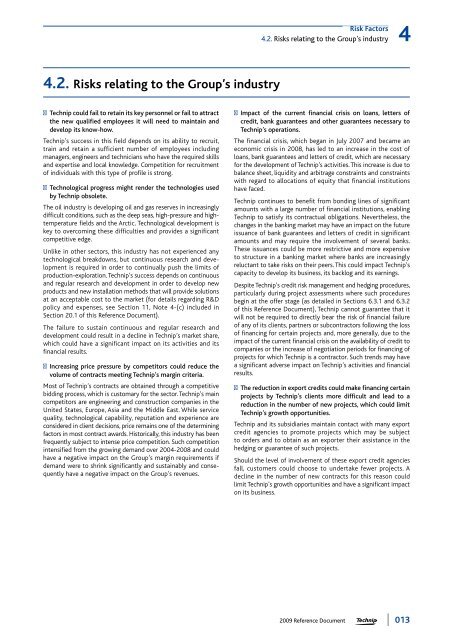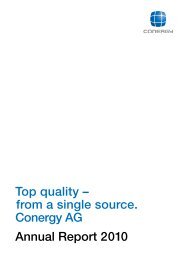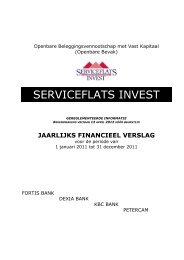Reference Document
Reference Document
Reference Document
Create successful ePaper yourself
Turn your PDF publications into a flip-book with our unique Google optimized e-Paper software.
Risk Factors<br />
4.2. Risks relating to the Group’s industry 4<br />
4.2. Risks relating to the Group’s industry<br />
Technip could fail to retain its key personnel or fail to attract<br />
the new qualified employees it will need to maintain and<br />
develop its know-how.<br />
Technip’s success in this field depends on its ability to recruit,<br />
train and retain a sufficient number of employees including<br />
managers, engineers and technicians who have the required skills<br />
and expertise and local knowledge. Competition for recruitment<br />
of individuals with this type of profile is strong.<br />
Technological progress might render the technologies used<br />
by Technip obsolete.<br />
The oil industry is developing oil and gas reserves in increasingly<br />
difficult conditions, such as the deep seas, high-pressure and hightemperature<br />
fields and the Arctic. Technological development is<br />
key to overcoming these difficulties and provides a significant<br />
competitive edge.<br />
Unlike in other sectors, this industry has not experienced any<br />
technological breakdowns, but continuous research and development<br />
is required in order to continually push the limits of<br />
production-exploration. Technip’s success depends on continuous<br />
and regular research and development in order to develop new<br />
products and new installation methods that will provide solutions<br />
at an acceptable cost to the market (for details regarding R&D<br />
policy and expenses, see Section 11, Note 4-(c) included in<br />
Section 20.1 of this <strong>Reference</strong> <strong>Document</strong>).<br />
The failure to sustain continuous and regular research and<br />
development could result in a decline in Technip’s market share,<br />
which could have a significant impact on its activities and its<br />
financial results.<br />
Increasing price pressure by competitors could reduce the<br />
volume of contracts meeting Technip’s margin criteria.<br />
Most of Technip’s contracts are obtained through a competitive<br />
bidding process, which is customary for the sector. Technip’s main<br />
competitors are engineering and construction companies in the<br />
United States, Europe, Asia and the Middle East. While service<br />
quality, technological capability, reputation and experience are<br />
considered in client decisions, price remains one of the determining<br />
factors in most contract awards. Historically, this industry has been<br />
frequently subject to intense price competition. Such competition<br />
intensified from the growing demand over 2004-2008 and could<br />
have a negative impact on the Group’s margin requirements if<br />
demand were to shrink significantly and sustainably and consequently<br />
have a negative impact on the Group’s revenues.<br />
Impact of the current financial crisis on loans, letters of<br />
credit, bank guarantees and other guarantees necessary to<br />
Technip’s operations.<br />
The fi nancial crisis, which began in July 2007 and became an<br />
economic crisis in 2008, has led to an increase in the cost of<br />
loans, bank guarantees and letters of credit, which are necessary<br />
for the development of Technip’s activities. This increase is due to<br />
balance sheet, liquidity and arbitrage constraints and constraints<br />
with regard to allocations of equity that financial institutions<br />
have faced.<br />
Technip continues to benefit from bonding lines of significant<br />
amounts with a large number of financial institutions, enabling<br />
Technip to satisfy its contractual obligations. Nevertheless, the<br />
changes in the banking market may have an impact on the future<br />
issuance of bank guarantees and letters of credit in significant<br />
amounts and may require the involvement of several banks.<br />
These issuances could be more restrictive and more expensive<br />
to structure in a banking market where banks are increasingly<br />
reluctant to take risks on their peers. This could impact Technip’s<br />
capacity to develop its business, its backlog and its earnings.<br />
Despite Technip’s credit risk management and hedging procedures,<br />
particularly during project assessments where such procedures<br />
begin at the offer stage (as detailed in Sections 6.3.1 and 6.3.2<br />
of this <strong>Reference</strong> <strong>Document</strong>), Technip cannot guarantee that it<br />
will not be required to directly bear the risk of financial failure<br />
of any of its clients, partners or subcontractors following the loss<br />
of financing for certain projects and, more generally, due to the<br />
impact of the current financial crisis on the availability of credit to<br />
companies or the increase of negotiation periods for financing of<br />
projects for which Technip is a contractor. Such trends may have<br />
a significant adverse impact on Technip’s activities and financial<br />
results.<br />
The reduction in export credits could make financing certain<br />
projects by Technip’s clients more difficult and lead to a<br />
reduction in the number of new projects, which could limit<br />
Technip’s growth opportunities.<br />
Technip and its subsidiaries maintain contact with many export<br />
credit agencies to promote projects which may be subject<br />
to orders and to obtain as an exporter their assistance in the<br />
hedging or guarantee of such projects.<br />
Should the level of involvement of these export credit agencies<br />
fall, customers could choose to undertake fewer projects. A<br />
decline in the number of new contracts for this reason could<br />
limit Technip’s growth opportunities and have a significant impact<br />
on its business.<br />
2009 <strong>Reference</strong> <strong>Document</strong><br />
013

















